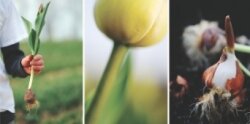Green gardener: 5 tips for growing organic
It's time to start digging in the dirt, and maybe you'd like to skip the pesticides and Roundup this year and go a little more au naturelle.
Ecotulips' Keriann Koenan offers six suggestions for growing organically.
1. Compost. Even nonorganic gardeners know that composting is the foundation for good soil, which is the basis of healthy plants. For the organic gardener, compost reduces the need to add synthetic fertilizers and creates stronger plants that can better handle disease and pests.
2. Heirloom seeds: Just through their longevity, older seeds are stronger varieties. Look for untreated and open-pollinated seeds, and you may have to ask if it's not clear from the package.
3. Mulching: Another gardening basic, mulching is even more important in an organic garden to cut down on weeds without using pesticides, since you'll be hand weeding. Koenan suggests straw, but says to make sure it hasn't been treated with an herbicide.
4. Organic fertilizer: If you must fertilize, two words–- hydrolyzed fish. Environmentally friendly, it uses the whole fish and puts all those nutrients in the soil and in your plants. And it doesn't stink. Not to be confused with fish emulsion.
5. Companion gardening: Tomatoes and basil are a winning combination on the plate, but they also work well in the garden together, as do tomatoes and asparagus. Tomatoes can ward off asparagus beetles, and asparagus juice can protect tomatoes from nematodes. And it never hurts to add marigolds. Koenan likes Carrots Love Tomatoes: Secrets of Companion Planting for Successful Gardening by Louise Riotte.


